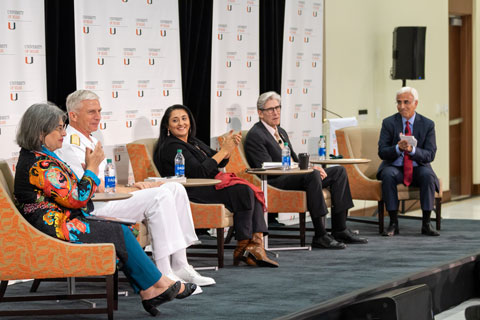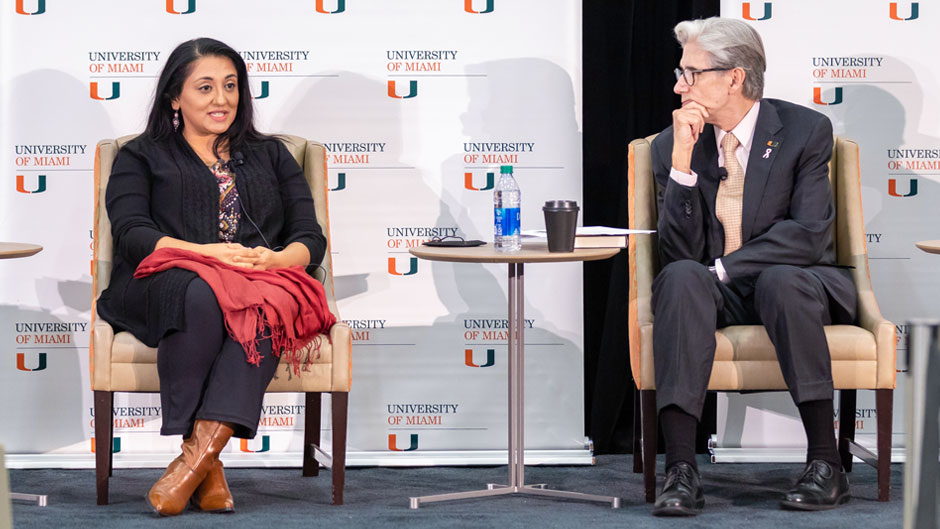Listen. Be receptive to different perspectives. And stay dedicated to the outcome, but humble enough to realize changes may be necessary.
These are strategies that a few of the region’s top leaders say have helped them stay focused amid the chaos of the COVID-19 pandemic, the collapse of the Champlain Towers South condominium in June, and last summer’s earthquake in Haiti.
University of Miami President Julio Frenk, Miami-Dade County Mayor Daniella Levine Cava, and Admiral Craig S. Faller, commander of Southern Command for the United States Navy, all joined psychology professor Amishi Jha and law professor Scott Rogers for a conversation Thursday evening on mindfulness, resilience, and leading through crisis. Rogers and Jha co-direct the University’s Mindfulness Research and Practice Initiative.
“We are here to talk about something everyone is trying to solve in our increasingly busy world,” Frenk said in his opening remarks. “How to focus our attention on the things that matter most.”
Jha has spent her career studying the science behind attention and researching how the practice of mindfulness can bolster a person’s ability to concentrate on a task. This week, Jha released her latest book “Peak Mind,” where she debunks the neuroscience behind our attention and offers research-based tips on how to stay focused with a growing number of distractions.
Because there are so many demands on our attention today, Jha pointed out that almost everyone struggles to focus. “This is a chronic modern conundrum,” she said. “So, I wanted to use my knowledge to inform as many people as I could about this thing called the brain science of attention and then to provide some solutions, so we could get that resource back for ourselves.”
Jha went on to explain why a person’s full attention is so crucial. “First and foremost, we need our attention to think,” she said. “To be able to hold information in mind, to deliberate, to learn, to make decisions—we need our attention. But we also need our attention to feel and regulate emotions, as well as to connect with other people. These are critical faculties.”
However, our attention can also be vulnerable, Jha noted. In situations of high stress, often a person or leader’s attention is degraded. And although many leaders have devised their own strategies for focusing, Jha found that mindfulness—or the ability to direct attention when needed into a particular direction—is a strategy anyone can learn to help improve their concentration. She and Rogers have trained athletes, military personnel, and first responders and learned that just 12 minutes of mindfulness training for about five days a week over two months can make a big difference.
Jha also explained how critical a leader’s attention can be in various situations. “Whatever it is we pay attention to changes the organization and functioning of the rest of the brain in many ways, so where leaders put their attention really does matter . . . because there will be ripples through all those they lead,” she said.
The psychology professor also explained how one’s attention can be thrown off course, and she described four critical elements often embedded in particularly challenging problems. Usually, they are volatile, uncertain, complex, or ambiguous, Jha said. “Those circumstances promote kryptonite for attention—things like stress, threat, and poor mood,” she added.
After her discourse, Jha, along with Rogers, then asked the panelists to describe some of their most trying situations and to explain how they focused.
Two decades before she became mayor, Levine Cava stated that she realized that she was addicted to action. But she also knew that she wanted to focus on being more present, so she went through a spiritual search. Afterward, her perspective changed.
“It brought me to the place where I am a listener today, I think, more than a talker,” she said. “And I did not run for office until I was in that state because you cannot be effective as a politician if you are not prepared to really listen to people. I have really moved into a different space of being able to focus in a way when I am with people that I wasn’t able to do before.”
That also led Levine Cava to employ her trusted strategy during the most difficult situation she has experienced as mayor—the early morning collapse of a massive condominium building in Surfside that killed 98 people. The tragedy forced Levine Cava, who had no military training, to become an incident commander overnight. Therefore, she listened to experts from law enforcement, fire rescue, and the Federal Emergency Management Agency, as well as survivors and the families of those who died in the tragedy, before she made decisions. Those experiences forced her to rely on her training in mindful feeling and thinking.
“I think not only listening but being highly attuned to a set of values is helpful,” said Levine Cava. “There are some of these things you practice and then they become instinctual. And then it becomes possible to be more focused in the moment and less distracted.”
Faller said that having a respect for others and their culture has helped him to stay focused amid the constant interruptions. He is an experienced seaman who has led the U.S. Navy’s Southern Command since 2018. This includes keeping the peace between the U.S. and 31 other countries, as well as saving lives, like after the Haiti earthquake this summer. He also makes sure that his teams plan and rehearse well for missions. And personally, he tries to get enough sleep and to exercise daily to keep his attention at optimal levels.
“When I sit down with a partner like a minister of defense, I try to respect their view,” said Faller, who is retiring next week. “Respect helps sort things out and makes this connection because without that trust, you are unable to do things.”
Frenk, an experienced global public health expert and former minister of health of Mexico, said that even with the experience of five past pandemics, he agonized about the decisions he made during the COVID-19 outbreak. In the role of University president, Frenk said his choices meant taking care of thousands of people who worked for the University, along with students—his daughter included among them, and his own family.
“The overriding feeling was responsibility. This is my sixth pandemic, but this time it was really personal,” he said.
Frenk said what kept him grounded when deciding whether to open the campus last fall was listening to others, while also focusing on data, trusted public health practices, and his experience.
“It’s important for leaders to listen but not to allow some of the feelings that flow to overwhelm and paralyze you,” he said. “You also need confidence and humility to monitor everything you do, because you may need to change course. So, you must remain flexible in face of a rapidly evolving situation [like the pandemic].”
Frenk also confessed that he was extremely fortunate to have completed a mindfulness training with Jha and Rogers just weeks before the COVID-19 pandemic began.
“And I have certainly relied on mindfulness to navigate the crisis of the past 20 months,” he said.

